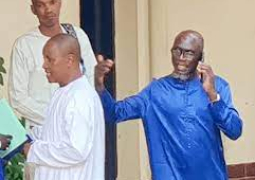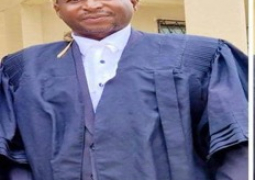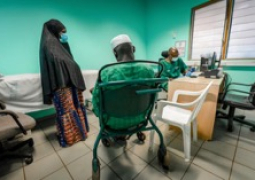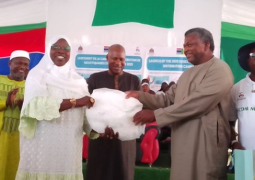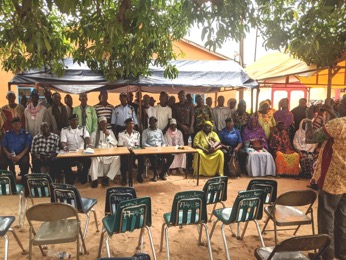
A week-long assessment exercise last week enumerated these residents of the town, located on the outskirts of Brufut, West Coast Region. When we visited there on the fourth day, Thursday, 31 October 2024, tens were gathered across their community center – comprising a built cement block and corrugated roof hall, along with two canvas tents lined with chairs. It still bears the historical concrete-walled well sunk by Brikama Area Council and inaugurated by former president Jawara and vice president Badara Njie, along with Chief Jerrehba Bojang and brother Sanjally Bojang in 1962 to welcome the residents to The Gambia.
Filling out the forms and conducting interviews for questionnaires were officials of the Gambia Commission on Refugees, the Statelessness Focal Point under the Gambia Immigration Department and the UN High Commission for Refugees office in the country.
“We were the first kids of this town over fifty years ago. Most of the founders have passed on, leaving behind their children and grandchildren. I see these residents as worthy nationals just as any other Gambian,” said Aminata. Her role at the exercise was to help verify if any non-members of the community attempt to join the exercise and get registered. To the Alkalo of Brufut, Amie holds institutional memory of Ghana Town, herself residing with the community.
“The purpose of the exercise is to quantify the number of residents there who face challenges of citizenship and nationality, a necessary step towards addressing gaps in Gambia’s nationality laws that can be filled by the new draft constitution,” said a Chief Superintendent of Gambia Immigration Department, Omar Camara, who is government focal person on stateless persons.
Mr Camara explained that Ghana Town was identified because of two statelessness advocacy workshop recommendations that targeted permanent secretaries at various ministries, lawmakers’ subcommittee on humanitarian relief and disaster of the National Assembly among other stakeholders.
“They have been in Ghana Town for over 50 years,” Camara explained. According to Ghanaian constitution, when one is not born in Ghana, they couldn’t qualify to be citizens of that country. While being born to Ghanaian parents pose challenges for those children born in Ghana Town in Gambia, it isn’t unless one of those parents is Gambian.
Alfred Nyarkoh, 47, father of seven, and an engineering professional, spoke on behalf of the community and explained that since their grandparents arrived in Gambia by boat in 1958, they resided in Bakau for about four years. They had cultivated productive living with host communities, first in Bakau and later Brufut before they were permanently allocated what became known as Ghana Town by consensus between Alkalolu of Brufut, Jambur and Bakau, a forested strip of land between the Brufut village and the sea.
The town became a vibrant fishing community, and other relatives followed them to resettle there. They contribute to community activities such as supporting children’s education. The community today has four schools, from nursery to primary and upper basic.
“They had their fair share of harassment from personnel of the immigration department, through raids for alien’s identity and having their vehicular travels interrupted at checkpoints because they lacked national ID cards,” Amie explained.
She sold porridge to the families in Ghana Town since her days as a girl child when her mum prepared the meal as a favourite of the children growing in this community. Ms Sanneh had once spent 48 hours in Immigration detention on suspicions that she alerted the residents to the arrival of the raiding immigration personnel through her famous call to clients, “Monoo Haboo” – meaning porridge is here Afanting and Asanting dialects of the residents – which the Immigration mistook for alerting the residents against them.
Around 2014, former President Yahya Jammeh announced a directive that the residents should be issued ID cards as Gambians. This does not equal the voting they enjoyed in the country since the 1960s general elections. Yet nationality issue became so much a nightmare for them. Jammeh’s directive brought them a temporary relief as many obtained national IDs and passports for the first time in The Gambia.
the issuance of national documents lacked merit because it was not backed by law, nor through an act of the National Assembly. Now, it is hoped that with this exercise, the gaps that led to such inconvenience for the residents would be permanently addressed, after an analysis of the data collected and an advisory provided to government for action.
The Gambia Commission for Refugees team leader, Mr Ebrima Manneh, described the exercise as satisfactory as school children, responsible members of the community have all turned out for the registration exercise, estimated to be around 300 by the a.m. of Thursday. The exercise targeted only those of 18 years and over.
Mr Manneh explained that the assessment is a national response to the 1954 UN Convention on Status of Statelessness and the 1961 Convention on Eradicating or Reduction of Statelessness, both of which The Gambia voluntarily signed. These placed responsibilities on the country to take measures to adhere to these conventions through national strategies like the ongoing exercise.
“It is Gambia’s obligation to provide the legal, regulatory and policy frameworks aimed at either reducing or eradicating statelessness in this country. Hence the UNHCR launched the I-Belong Campaign to achieve these aims considerably by December 2024,” Manneh explained.


